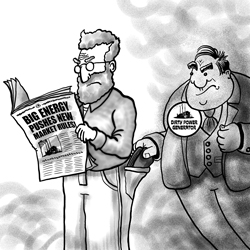On Tuesday, Nov. 6, CUB filed comments before the Federal Energy Regulatory Commission (FERC), protesting a proposal favored by out-of-state  fossil-fuel generators that could undermine Illinois energy policy and send ComEd bills skyrocketing.
fossil-fuel generators that could undermine Illinois energy policy and send ComEd bills skyrocketing.
Specifically, the generators want to change the rules governing a special electricity market—called a “capacity market”—that covers ComEd territory. CUB Executive Director David Kolata has said the proposal “would have devastating consequences for Illinois consumers.” Former Illinois Commerce Commission member Ann McCabe and John Moore of the Natural Resources Defense Council add that the proposal is “akin to a billion-dollar giveaway at consumers’ expense to a few lucky fossil fuel generators.”
So what is capacity?
It refers to extra payments consumers have to pay to generators to make sure their power plants have enough “capacity” (electricity available) during those hours when demand is highest. (Think of a very hot summer afternoon, when everyone is blasting the AC and factories are humming.)
PJM Interconnection, the power grid operator for northern Illinois and all or part of 12 other states and Washington, D.C., manages separate auctions for the selling of energy and capacity. These auctions are the largest of their kind in the country, covering 65 million customers and about 20 percent of the country’s power supply.
In energy auctions, electricity is sold to be used immediately. However, PJM holds capacity auctions three years in advance to make sure there will be enough power available to serve periods of high demand for the corresponding year.
How does it affect my bill?
Capacity charges are embedded in the electricity supply charge on your power bill. While actual electricity prices have been low, capacity has become a bigger and bigger part of your bill in recent years, and is now about 21 percent of the supply charge, according to the Illinois Commerce Commission. (By the way, alternative energy suppliers as well as ComEd buy electricity on this market. So you won’t escape capacity charges by changing suppliers.) CUB has long said that capacity market rules are stacked against consumers, causing us to pay higher bills. Now, this new proposal before FERC would make it even worse.
Why do generators want to change the rules?
Big out-of-state corporations that own fossil-fuel generators—companies like FirstEnergy, Vistra, Calpine, and NRG—want PJM to change the capacity auction rules to offset state legislation, like Illinois’ historic Future Energy Jobs Act. The act expands energy efficiency and gives financial support to clean energy generators, helping to depress prices in the capacity market. That makes it difficult for coal-fired plants to compete, cutting into their profits and forcing some plants to close.
How do the fossil-fuel generators want to change the market?
It’s complex, but basically those generators want to artificially inflate the capacity price. That means we would pay more on our electricity bills to prop up power generators—including coal-fired power plants— that normally wouldn’t be able to compete in the capacity market. CUB Executive David Kolata told Crain’s Chicago Business that the proposed changes would punish Illinois for making clean energy improvements like the Future Energy Jobs Act.
How much would this cost consumers?
A new analysis by an independent market monitor estimates the proposal could increase power bills by up to $8 billion a year for the power grid that stretches across 13 states, including northern Illinois.
When will FERC decide if it will approve the rules?
A final FERC ruling is expected in early 2019. CUB will challenge any negative ruling in court, but don’t expect the fight to end there. This dispute could easily spill into the Illinois General Assembly, where consumer advocates would push for the state to institute its own capacity-related reforms. Stay tuned!
What can I do?
Sign our petition, and get ready for a long fight.

